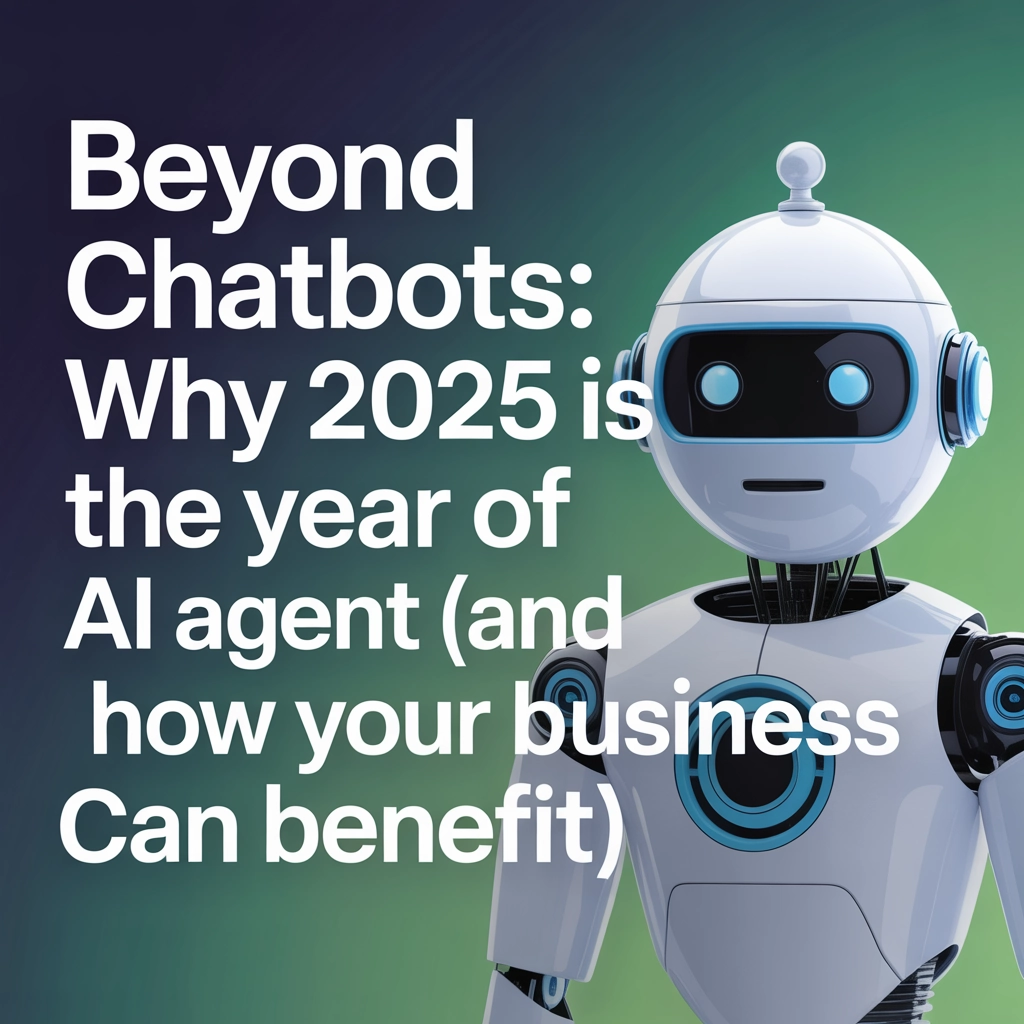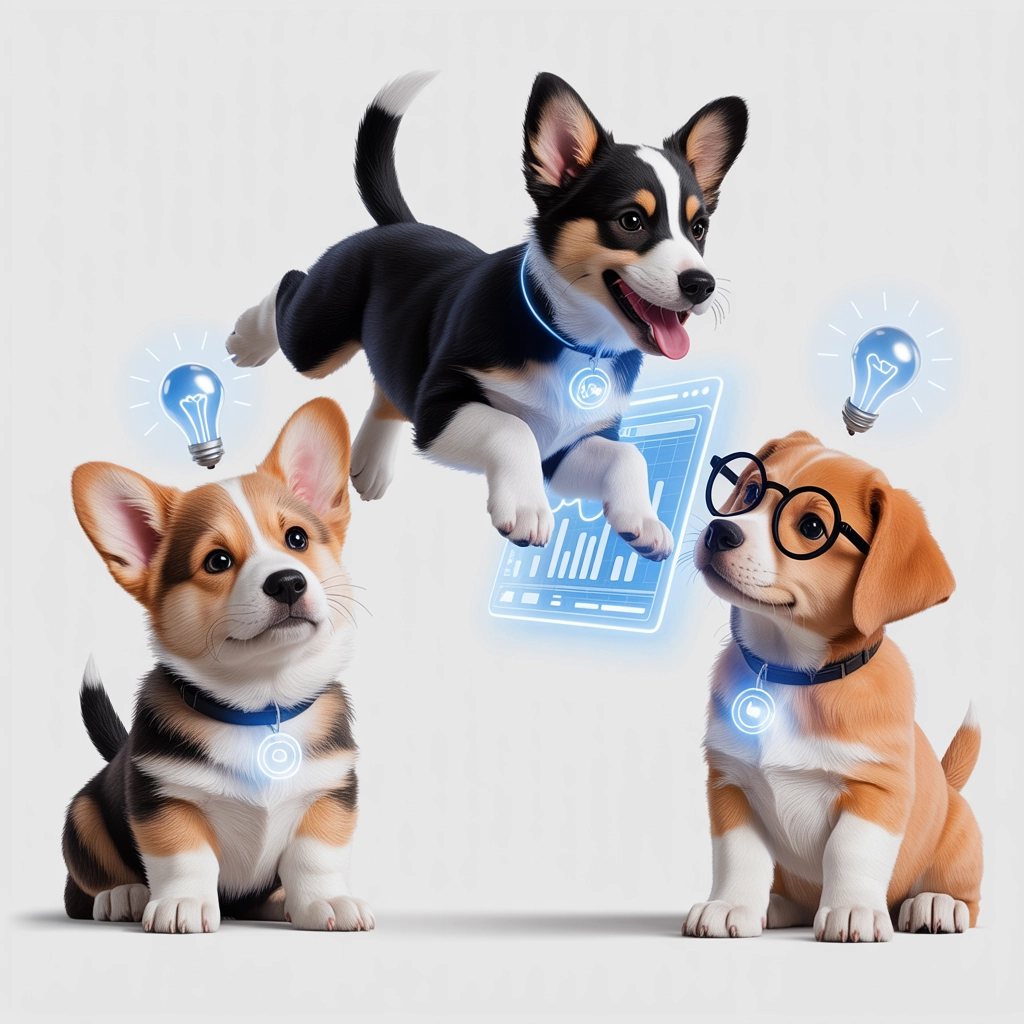Beyond Chatbots: Why 2025 Is the Year of the AI Agent (And How Your Business Can Benefit)
Discover how AI agents are revolutionizing business operations in 2025, moving beyond simple chatbots to autonomous decision-makers that transform customer experience and operational efficiency.

 🐾
🐾Beyond Chatbots: Why 2025 Is the Year of the AI Agent (And How Your Business Can Benefit)

Remember when having a basic chatbot on your website felt cutting-edge? Those days are firmly behind us. As we navigate through 2025, we're witnessing a fundamental shift in how artificial intelligence interfaces with businesses and customers alike. The humble chatbot—once revolutionary—has evolved into something far more powerful: the autonomous AI agent.
The Great Leap: From Reactive Chatbots to Proactive AI Agents
Traditional chatbots were essentially glorified decision trees with a conversational interface—they followed predetermined paths and couldn't venture beyond their programming. Most fell into one of two categories:
- Rule-based chatbots: Operating on if/then logic with zero flexibility
- Basic AI chatbots: Using simple machine learning to recognize patterns but still limited to predefined responses
By contrast, today's AI agents represent an evolutionary leap. They don't just respond—they think, act, and learn.

What Makes 2025 the Tipping Point for AI Agents?
Several converging factors have made 2025 the year AI agents reached critical mass:
1. The Maturation of Foundation Models
The latest generation of foundation models can now:
- Process contextual nuance across 12+ dimensions simultaneously
- Understand implied needs beyond explicit requests
- Generate creative solutions to novel problems
- Maintain memory and context across extended interactions
2. Integration Capabilities Reached Critical Mass
Modern AI agents can now:
- Connect seamlessly with 90% of enterprise systems via standardized APIs
- Access and manipulate data across previously siloed departments
- Execute complex multi-step workflows without human intervention
- Self-authorize within appropriate security boundaries
3. Demonstrable ROI Became Undeniable
Early adopters are reporting:
- 40-60% reduction in customer service costs
- 22-35% increases in sales conversion rates
- 15-30% improvement in operational efficiency
- 50-70% faster resolution times for customer issues
The Four Dimensions That Define True AI Agents
What precisely separates a sophisticated chatbot from a genuine AI agent? Four key capabilities:
1. Autonomous Decision-Making
AI agents don't just follow instructions—they make judgment calls based on complex criteria. For instance, an AI sales agent might:
- Determine which prospects deserve priority attention based on behavior signals
- Adjust pricing dynamically within approved thresholds
- Choose the optimal communication channel for each customer
- Time follow-ups based on engagement analytics
2. Multi-System Orchestration
Unlike chatbots that operate in isolation, AI agents coordinate across systems:
- A customer service agent might simultaneously access your CRM, knowledge base, billing system, and inventory management
- A marketing agent could analyze web analytics, social sentiment, competitor activity, and internal content repositories before making recommendations
- An operations agent might balance inputs from supply chain, workforce management, and financial forecasting systems
3. Continuous Learning & Adaptation
Today's AI agents improve through:
- Self-directed analysis of successful vs. unsuccessful interactions
- Incorporation of human feedback without explicit reprogramming
- Pattern recognition across thousands of similar scenarios
- Experimentation within safe parameters
4. Proactive Initiation
Perhaps most importantly, AI agents don't wait to be asked:
- They monitor systems for anomalies and opportunities
- They begin workflows based on predictive triggers
- They suggest improvements before problems become apparent
- They coordinate with human teams at optimal intervention points

Real-World Business Benefits Across Departments
The abstract capabilities of AI agents translate to concrete business advantages:
Customer Experience Transformation
AI agents are revolutionizing how businesses interact with customers:
-
Personalization at scale: They can recall every past interaction, preference, and purchase pattern to create truly personalized experiences without the cognitive limitations of human agents.
-
Contextual problem-solving: Unlike chatbots that escalate complex issues, AI agents can solve multi-dimensional problems. For example, an agent might recognize that a customer's shipping complaint relates to their recent address change, outdated payment method, and seasonal delivery constraints—then solve all three issues simultaneously.
-
Emotional intelligence: Advanced sentiment analysis allows agents to detect frustration, confusion, or satisfaction and adjust their approach accordingly—switching between efficiency mode and high-empathy mode as needed.
Operational Excellence
Operations teams are leveraging AI agents to:
-
Optimize resource allocation: AI agents continuously monitor workloads, identify bottlenecks, and redistribute resources in real-time across departments.
-
Predictive maintenance: Instead of fixed schedules, AI agents can monitor equipment performance data and preemptively schedule maintenance only when truly needed.
-
Intelligent inventory management: Beyond basic reordering, agents can analyze seasonal trends, supply chain disruptions, and even social media signals to prevent stockouts while minimizing carrying costs.
Revenue Acceleration
Sales and marketing functions benefit from:
-
Prospect qualification: AI agents can engage with inbound leads 24/7, qualifying them through natural conversation rather than forms, and routing only the most promising opportunities to human salespeople.
-
Competitive intelligence: Agents continuously monitor competitor pricing, promotions, and positioning, alerting teams to strategic threats and opportunities.
-
Dynamic pricing optimization: By analyzing real-time demand signals, competitor pricing, and inventory levels, agents can adjust pricing strategy within approved parameters to maximize revenue.
Innovation Catalysts
Perhaps most excitingly, AI agents are becoming innovation partners:
-
Idea generation: By analyzing market trends, customer feedback, and internal capabilities, agents can suggest new product features or service offerings.
-
Rapid prototyping: Agents can create functional prototypes of digital products, test them with simulated user interactions, and iterate based on results.
-
Cross-pollination: By working across departmental boundaries, agents often identify innovation opportunities that siloed human teams might miss.

Implementation Strategy: The Path Forward
Organizations succeeding with AI agents follow a consistent pattern:
1. Start With High-Value, Bounded Use Cases
Rather than a company-wide rollout, successful implementations begin with specific, high-impact scenarios:
- Customer onboarding processes
- Technical support for common product issues
- Routine procurement workflows
- Sales qualification conversations
2. Build Internal AI Agent Expertise
Effective implementation requires new skills:
- AI agent orchestration specialists
- Prompt engineering experts
- Agent analytics interpreters
- Human-AI collaboration coaches
3. Create Governance Frameworks
As AI agents gain autonomy, proper oversight becomes crucial:
- Decision authority matrices (what agents can decide independently)
- Performance monitoring systems
- Intervention protocols for edge cases
- Continuous improvement mechanisms
4. Evolve, Don't Replace, Human Roles
The most successful organizations don't use AI agents to replace workers but to elevate them:
- Customer service agents become relationship managers
- Sales representatives become strategic advisors
- Operations staff become systems optimizers
- Marketing teams become strategy directors
The Business Imperative: Act Now or Fall Behind
The transition from chatbots to AI agents isn't just a technology upgrade—it's a business imperative. Organizations that cling to outdated chatbot technology in 2025 face:
- Competitive disadvantage: As competitors adopt AI agents, the experience gap becomes immediately apparent to customers.
- Efficiency handicaps: Manual processes that competitors have automated create unsustainable cost structures.
- Talent attrition: Top performers will gravitate toward organizations that augment their capabilities with cutting-edge AI.
- Innovation stagnation: Without AI agents continuously identifying improvement opportunities, organizations become reactive rather than proactive.
The Path Forward
As we look toward the remainder of 2025 and beyond, the distinction between AI haves and have-nots will increasingly define market leaders. The question is no longer whether to implement AI agents, but how quickly and effectively your organization can deploy them.
The good news? The technology has matured to the point where implementation is more accessible than ever before. With the right strategy and partners, even mid-sized organizations can harness the power of AI agents to transform their operations, delight their customers, and outmaneuver their competition.
The chatbot era served us well, but in 2025, it's time to embrace the age of the AI agent—and all the business possibilities it unlocks.
 🐾
🐾